Plot
To the pealing of church bells, Luther begins to ascend into his pulpit to preach, but he is hindered by stomach cramps. It is 1525 at the time of the Peasants' Revolt. He looks out facing the camera and sees a wounded knight wheeling in a hand cart that holds the body of a fallen comrade. The knight sardonically regales Luther with some of his accomplishments but then accuses him of abandoning those who got his reformation for him. Luther denies this, and the knight dips his right hand into his comrade's blood and wipes it across Luther's white surplice, telling him he now looks like a butcher. Luther stares silently. The film will return to this scene at this very point after the presentation of all the events of the story that precede it (1506–1525).

The German Peasants' War, Great Peasants' War or Great Peasants' Revolt was a widespread popular revolt in some German-speaking areas in Central Europe from 1524 to 1525. It failed because of the intense opposition by the aristocracy, who slaughtered up to 100,000 of the 300,000 poorly armed peasants and farmers. The survivors were fined and achieved few, if any, of their goals. The war consisted, like the preceding Bundschuh movement and the Hussite Wars, of a series of both economic and religious revolts in which peasants and farmers, often supported by Anabaptist clergy, took the lead. The German Peasants' War was Europe's largest and most widespread popular uprising prior to the French Revolution of 1789. The fighting was at its height in the middle of 1525.
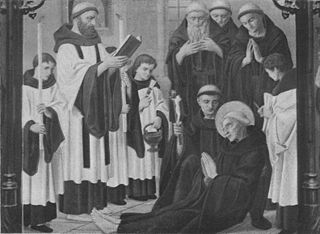
A surplice is a liturgical vestment of the Western Christian Church. The surplice is in the form of a tunic of white linen or cotton fabric, reaching to the knees, with wide or moderately wide sleeves.
The scene shifts to the Augustinian monastery in Erfurt in 1506, when Luther becomes a full-fledged monk of the Order of Eremites of St. Augustine at the completion of his novitiate. Following the vesting of the new monk the young knight takes on the role of narrator and commentator for the rest of the film, explaining that Luther had become a monk to protect his soul from demonic attack and that he sought to outdo his brothers in the "counsels of perfection" in order to suppress internal murmurings of doubt. Luther is shown serving his brothers in the refectory, cleaning the cloister's latrines, washing the dishes, shivering in cold as he tries to sleep in his cell, and pacing back and forth in prayer. An important line of Luther's at this point is, "I am afraid of the darkness and the hole in it ... and there's no bottom to it!" He is so overwhelmed by his own sinfulness that he all but bursts open when he is making his confession. In a daily office he leaves the stalls where his brother monks are chanting a psalm, and he collapses in a fit before the altar. The knight reports that he suffered in that way for months but that he was able to cope with his doubts by "dropping them" from out of his head and into his bowels, i.e., becoming constipated.

The three evangelical counsels or counsels of perfection in Christianity are chastity, poverty, and obedience. As Jesus of Nazareth stated in the Canonical gospels, they are counsels for those who desire to become "perfect". The Catholic Church interprets this to mean that they are not binding upon all and hence not necessary conditions to attain eternal life (heaven). Rather they are "acts of supererogation" that exceed the minimum stipulated in the Commandments in the Bible. Catholics that have made a public profession to order their life by the evangelical counsels, and confirmed this by a public religious vow before their competent church authority, are recognised as members of the consecrated life.
Luther is then shown in his cell just before his first mass. His friend Brother Weinand comes in to tell him that his father has come to attend. In the course of vesting Luther, Weinand has him confess the Apostles' Creed, repeating twice the article, "the forgiveness of sins" to bring home to Luther that he is expected to believe that his sins are forgiven if he confesses this creed. This is the first time in the film that Luther is confronted. In this confrontation Weinand ends by telling Luther, "God isn't angry with you. It is you that are angry with him."
The Apostles' Creed, sometimes titled the Apostolic Creed or the Symbol of the Apostles, is an early statement of Christian belief—a creed or "symbol". It is widely used by a number of Christian denominations for both liturgical and catechetical purposes, most visibly by liturgical Churches of Western tradition, including the Catholic Church, Lutheranism and Anglicanism. It is also used by Presbyterians, Moravians, Methodists and Congregationalists.
When Weinand leaves, Luther imagines he sees Jesus Christ as a fearful judge seated on a rainbow with a sword poised to punish him. This image takes him into the saying of his first mass, which he does poorly by seeming to forget the words of the liturgy. He then faces his father at the reception in the refectory. When father and son are left alone, Hans Luther scolds his son for failing to keep the commandment to honor father and mother when he left the study of law to enter the convent. He also tells him that he believes that Luther is murdering himself in the convent. This is the second confrontation. Luther defends himself by affirming that he did see a vision in the thunderstorm that moved him to make a promise to St. Anne to become a monk. He also shares how he felt closest to his father.
The knight begins the next segment with the statement: "So the praising ended, and the blasphemy began." Johann Tetzel is portrayed preaching indulgences with great pomp and circumstance. He makes the bold claim that his indulgences would even provide forgiveness for one who offered violence to the Virgin Mary. In the next scene Luther comes upon his mentor Vicar General Johann von Staupitz as he dozes under a pear tree. Staupitz confronts Luther for a third time with the accusation that he resents authority and makes it look ridiculous by his meticulous observance of his monastic rule. Staupitz urges Luther to articulate his position among his peers in Latin rather than in the vernacular German that would encourage the peasants and young knights to revolt.
Luther then is shown preaching a sermon on the eve of All Saints' Day, 1517, in which he graphically tells how he discovered the gospel of justification by faith alone while sitting on the latrine. He declares that someone has to "bell the cat," and with that he goes out to post his Ninety-five Theses . Luther is then confronted for the fourth time by Tetzel and Thomas Cardinal Cajetan de Vio at Augsburg in the fall of 1518. Cajetan warns Luther that if he does not retract his "errors and sermons" that the unity of Christendom would be sundered. Luther refuses, and Cajetan concludes, "That man hates himself, and if he goes to the stake, Tetzel, you can inscribe it: 'he could only love others.'"
The next scene shows Luther burning the bull Exsurge Domine in defiance of the pope. He then falls to the ground in a fit for a second time in the film. In a prayer he reminds God that the cause he is fighting is God's not his. He wonders if God is dead, concluding that God cannot die but only hide himself.
The famous session of the Diet of Worms is portrayed when Luther appears for the second time. The inquisitor is portrayed as Johann Eck. Luther is now confronted for the fifth time by Eck, who interrupts his "Here I Stand" speech with the warning that the common man is so greedy as to be incited to revolt if he does not recant. Luther refuses, and the momentousness of that action is emphasized in the film. The young knight exults in the moment: if Luther wanted to he could have led a successful revolt against established authority. The knight breaks off his ardor by disgustedly stating that Luther issued a plea for the extermination of the rebels, his Against the Murderous, Thieving Hordes of Peasants. Luther is portrayed as standing before the emperor and the princes declaiming a portion of his notorious tract. The emperor and the princes walk past Luther with their swords drawn to put down the peasants.
Luther is then shown wandering through a devastated marketplace where peasants had been slaughtered. He is brought once again to where he had been confronted by the young knight, who wipes blood across his surplice: Luther is confronted for the fifth time. Luther defends himself with the assertion: "God is the butcher. Address your abuse to him." Luther then tells the story of the Sacrifice of Isaac by Abraham, concluding that God gives life when nothing seems imminent but death.
Luther is confronted for the seventh and final time by old Staupitz who has come to visit Martin and his wife Katie. Luther admits that the peasants had just cause but that as a mob they were against Christ. Staupitz is relieved to hear that Luther was not sure when he took his stand at Worms. Luther prays, "Help my unbelief." Katie comes in with their infant son Hans, who cannot get to sleep. Luther repeats his superstition that passing air in the devil's face wards him off: going from being anal retentive to being anal expulsive shows one has overcome one's doubts and fears. In the final scene Luther takes the baby into his pulpit and assures him that "the dark isn't quite as thick as all that," that they should hope that Christ will be true to his word, "A little while and you'll not see me, and then again a little and you shall see me" (John 16:16).

Johann Tetzel was a German Dominican friar and preacher. He was appointed Inquisitor for Poland and Saxony, later becoming the Grand Commissioner for indulgences in Germany. Tetzel was known for granting indulgences on behalf of the Roman Catholic Church in exchange for money, which are claimed to allow a remission of temporal punishment due to sin, the guilt of which has been forgiven, a position heavily challenged by Martin Luther. This contributed in part to the Reformation.

Johann Maier von Eck, often Anglicized as John Eck, was a German Scholastic theologian, Catholic prelate, and early counterreformer who was among Martin Luther's most important interlocutors and theological opponents.
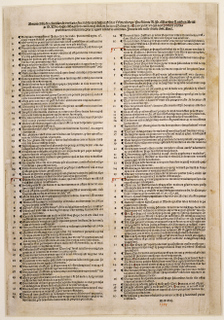
The Ninety-five Theses or Disputation on the Power of Indulgences is a list of propositions for an academic disputation written in 1517 by Martin Luther, professor of moral theology at the University of Wittenberg, Germany. They advanced Luther's positions against what he saw as the abuse of the practice of clergy selling plenary indulgences, which were certificates believed to reduce the temporal punishment in purgatory for sins committed by the purchasers or their loved ones. In the Theses, Luther claimed that the repentance required by Christ in order for sins to be forgiven involves inner spiritual repentance rather than merely external sacramental confession. He argued that indulgences led Christians to avoid true repentance and sorrow for sin, believing that they could forgo it by purchasing an indulgence. They also, according to Luther, discouraged Christians from giving to the poor and performing other acts of mercy, believing that indulgence certificates were more spiritually valuable. Though Luther claimed that his positions on indulgences accorded with those of the Pope, the Theses challenge a 14th-century papal bull stating that the pope could use the treasury of merit and the good deeds of past saints to forgive temporal punishment for sins. The Theses are framed as propositions to be argued in debate rather than necessarily representing Luther's opinions, but Luther later clarified his views in the Explanations of the Disputation Concerning the Value of Indulgences.

The Diet of Worms 1521 was an imperial diet (assembly) of the Holy Roman Empire called by King Charles V. It was held at the Heylshof Garden in Worms, then an Imperial Free City of the Empire. An imperial diet was a formal deliberative assembly of the whole Empire. This one is most memorable for the Edict of Worms, which addressed Martin Luther and the effects of the Protestant Reformation.
It was conducted from 28 January to 25 May 1521, with the Emperor Charles V presiding.

Johann Cochlaeus (Cochläus) was a German humanist, music theorist, and controversialist.
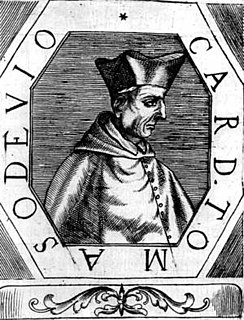
Thomas Cajetan, also known as Gaetanus, commonly Tommaso de Vio or Thomas de Vio, was an Italian philosopher, theologian, cardinal and the Master of the Order of Preachers 1508-18. He was a leading theologian of his day who is now best known as the spokesman for Catholic opposition to the teachings of Martin Luther and the Protestant Reformation while he was the Pope's Legate in Augsburg, and perhaps also among Catholics for his extensive commentary on the Summa Theologica of Thomas Aquinas.
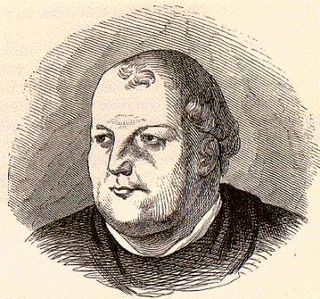
Johann von Staupitz, O.S.A. was a Catholic theologian, university preacher, and Vicar General of the Augustinian friars in Germany, who supervised Martin Luther during a critical period in his spiritual life. Martin Luther himself remarked, "If it had not been for Dr. Staupitz, I should have sunk in hell." Although he remained Catholic, died as a Benedictine monk and had repudiated the Reformation, he is commemorated on 8 November as a priest in the Calendar of Saints of the Lutheran Church–Missouri Synod.
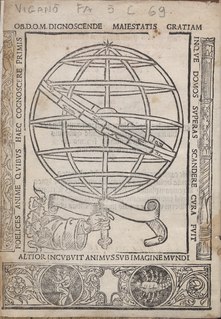
Sylvester Mazzolini, in Italian Silvestro Mazzolini da Prierio, in Latin Sylvester Prierias. was a theologian born at Priero, Piedmont; he died at Rome. Prierias perished when the imperial troops forced their way into the city, leading to the Sack of Rome.
Against the Murderous, Thieving Hordes of Peasants is a piece written by Martin Luther in response to the German Peasants' War. Beginning in 1524 and ending in 1526, the Peasants' War was a result of a tumultuous collection of grievances in many different spheres: political, economic, social, and theological. Martin Luther is often considered to be the foundation for the Peasants' Revolt; however, he maintained allegiance to the Princes against the violence of the rebels. Against the Murderous, Thieving Hordes of Peasants typifies Luther's reaction to the Peasants' War, and alludes to Luther's concern that he might be seen to be responsible for their rebellion.
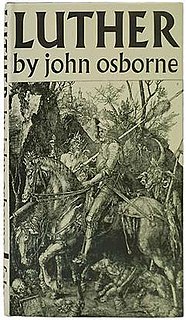
Luther is a 1961 play by John Osborne depicting the life of Martin Luther, one of the foremost instigators of the Protestant Reformation. Albert Finney created the role of Luther, which he performed with the English Stage Company at the Theatre Royal, Nottingham, the Théâtre Sarah Bernhardt, Paris, the Holland Festival, the Royal Court Theatre, London, the Phoenix Theatre, London, and the St. James Theatre, New York.

William IV was Duke of Bavaria from 1508 to 1550, until 1545 together with his younger brother Louis X, Duke of Bavaria.
He was born in Munich to Albert IV and Kunigunde of Austria, a daughter of Emperor Frederick III.
The Knights' Revolt was a revolt by a number of Protestant and religious humanist German knights led by Franz von Sickingen, against the Roman Catholic Church and the Holy Roman Emperor. It has also been called the "Poor Barons' Rebellion." The revolt was short-lived but would inspire the bloody German Peasants' War of 1524–1526.

Lutheranism as a religious movement originated in the early 16th century Holy Roman Empire as an attempt to reform the Roman Catholic Church. The movement originated with the call for a public debate regarding several issues within the Catholic Church by Martin Luther, then a professor of Bible at the young University of Wittenberg. Lutheranism soon became a wider religious and political movement within the Holy Roman Empire owing to support from key electors and the widespread adoption of the printing press. This movement soon spread throughout northern Europe and became the driving force behind the wider Protestant Reformation. Today, Lutheranism has spread from Europe to all six populated continents.
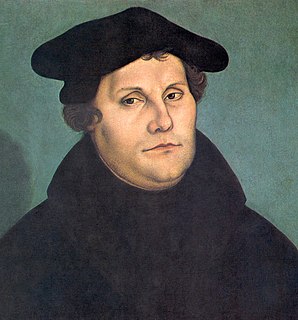
Martin Luther, was a German professor of theology, composer, priest, monk, and a seminal figure in the Protestant Reformation.
Bartholomaeus Arnoldi, OSA was an Augustinian friar and doctor of divinity who taught Martin Luther and later turned into his earliest and one of his personally closest opponents.

Martin Luther is a 1953 American–West German film biography of Martin Luther. It was directed by Irving Pichel,, and stars Niall MacGinnis as Luther. It was produced by Louis de Rochemont and RD-DR Corporation in collaboration with Lutheran Church Productions and Luther-Film-G.M.B.H.
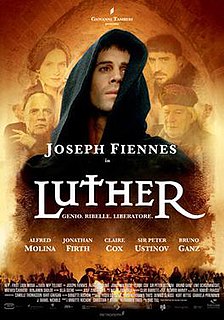
Luther is a 2003 American-German epic historical drama film loosely based on the life of Martin Luther starring Joseph Fiennes. It was an independent film partially funded by Thrivent Financial for Lutherans. The film covers Luther's life from his becoming a monk in 1505 to the Diet of Augsburg in 1530.

Luther is a 1928 German film about the life of Martin Luther, father of the Protestant Reformation.

The Leipzig Debate was a theological disputation originally between Andreas Karlstadt, Martin Luther, and Johann Eck. Karlstadt, dean of the Wittenberg theological faculty, felt he had to defend Luther against Eck's critical commentary on the 95 theses. So he challenged Johann Eck, a professor of theology at Ingolstadt university, to a public debate concerning the doctrines of free will and grace. The Leipzig Debate took place in June and July 1519 at Pleissenburg Castle in Leipzig, Germany. Its purpose was to discuss Martin Luther's teachings, and was initiated and conducted in the presence of George, Duke of Saxony, an opponent of Luther. Eck, considered the master debater in Germany, was concerned about clerical abuses, but his life's work had been dedicated to the defence of Catholic teachings and combating heresy.
Martin Luther, Heretic is a 1983 film made to commemorate the 500th anniversary of the birth of Martin Luther. It was released on November 8, 1983 in the United Kingdom, two days before the 500th jubilee on November 10. It starred Jonathan Pryce as Martin Luther. Maurice Denham reprised his role of Johann von Staupitz that he played in the 1973 American Film Theater film Luther. The time frame of the film is 1506-1522: the beginning of Luther's monastic vocation to his return from exile at the Wartburg in 1522. A medieval dramatic troupe's performances of mystery plays provide the unifying motif for a parallel telling of the story of the film. When Luther's carriage en route from the Wartburg to Wittenberg it is shown passing an actor wearing a devil's mask. When this scene is revisited at the end of the film, the actor slips this mask off his face.
























